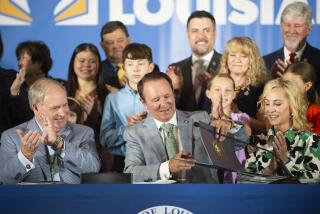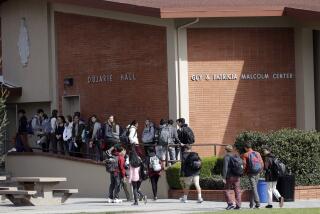Justices OK School Prayer Meeting, but Only on Technicality
- Share via
WASHINGTON — The Supreme Court, ducking one of the toughest issues it faced this term, said today that Williamsport, Pa., high school students may hold prayer meetings at schools but refused to give its blessing to the practice.
The court, in a 5-4 decision, decided the case on narrow legal grounds. The justices did not rule on the basic constitutional question in the religious freedom dispute.
In another major religion case, the justices ruled 5 to 4 that the military can prohibit an Orthodox Jew from wearing a yarmulke, a skullcap, on duty.
In the school prayer case, the court ruled that the lone member of the school board who appealed a court decision allowing the students to hold the prayer meetings in the public school building did not have legal standing to bring the suit.
The high court’s action does not rule out future suits on the same issue but has the effect of leaving intact a federal district court’s decision permitting the meetings.
Writing for the majority, Justice John Paul Stevens said that Williamsport School Board member John Youngman, who fought to block the prayer meetings, had no personal stake in the dispute and “therefore did not have standing” to take the case to the appeals court that eventually banned the meetings.
Burger’s Dissent
However, Chief Justice Warren E. Burger, in a dissent, said Youngman had standing as a parent of a student and chided the majority for avoiding the heart of the dispute.
“I would reach the issue the court granted (a hearing) to address: whether the Establishment Clause (of the First Amendment) requires a public high school to prevent a student-initiated, student-led group from meeting during an extracurricular activity period,” Burger said.
He said, “The Establishment Clause mandates state neutrality, not hostility, toward religion.”
In 1981, a Christian student group called Petros asked that it be allowed to meet during the half-hour student activity period Williamsport High School set aside two mornings a week for student clubs.
The principal agreed, but the school’s attorney concluded that it would violate the First Amendment and the school board halted the meetings.
Banned by Circuit Court
Students then went to federal court and won. Youngman took the dispute to the U.S. 3rd Circuit Court of Appeals, which banned the meetings July 24, 1984.
In the yarmulke case, Justice William H. Rehnquist said for the majority that the military’s need to have a uniform dress code outweighs the right of Dr. S. Simcha Goldman to practice his faith as he sees fit.
“The desirability of dress regulations in the military is decided by the appropriate military officials, and they are under no constitutional mandate to abandon their considered professional judgment,” the opinion said.
In other actions today, the court:
--Ruled that local governments can be held liable for damages for a single act if that act was taken deliberately by officials responsible for setting policy. The decision means that a Cincinnati doctor may sue county officials for a May, 1977, incident in which police battered down a door at his clinic.
--Sidestepped a mother’s challenge to a six-year statute of limitations for filing paternity suits.
More to Read
Get the L.A. Times Politics newsletter
Deeply reported insights into legislation, politics and policy from Sacramento, Washington and beyond. In your inbox three times per week.
You may occasionally receive promotional content from the Los Angeles Times.










